
Here is a recent short film made in the old city of Sanaa and entitled “Mono” by Mohammed AlAsbahi. The film has a profound message and is well worth watching. It can be found on Youtube.

Here is a recent short film made in the old city of Sanaa and entitled “Mono” by Mohammed AlAsbahi. The film has a profound message and is well worth watching. It can be found on Youtube.
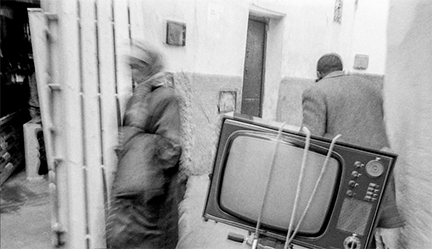
اما المراكشي داود ولد سيد، المتأثر بالمصورين هنري كارتييه بريسو وروبرت Ùرانك وريتشارد اÙيدون، Ùقد تخصص بتصوير الرØلات المنÙردة التي قام بها ÙÙŠ ارجاء المغرب. ÙÙŠ هذه الصورة، ينقل رجل جهاز تلÙاز ÙÙŠ الرباط.
The Arabic BBC website has presented several photographs for a proposed Moroccan Photography Museum in Marrakesh. Here are two of the photographs.
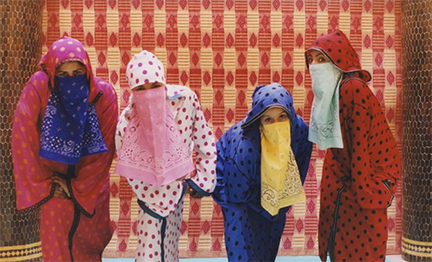
Øسن Øجاج الذي ولد ÙÙŠ المغرب عام 1961 غادر بلاده الى لندن ÙÙŠ سن مبكرة. تجمع اعمال Øجاج العناصر المرئية Ù„ÙÙ† تصوير الازياء المعاصر مع ÙÙ† البوب.
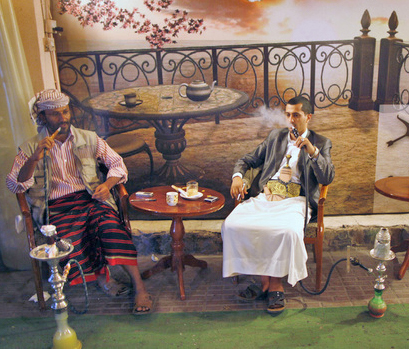
Men smoke shisha water pipes in a cafe in Sanaa, Oct. 1, 2011. (photo by REUTERS/Ahmed Jadallah)
Yemen’s Modern Coffee Shops: Progressive, Yet Exclusive
by Farea al-Muslimi, Al-Monitor, September 5 2013
SANAA, Yemen — Over the past few decades, Yemen has been known to conjure images of serious conservatism, isolation between men and women and male dominance over issues pertaining to daily life.
However, things look different here: A group of boys, girls, men and women are having discussions in modern coffee shops, which have become popular in the past 10 years and have significantly become more common across Sanaa in the past few years, including the historical part of the old city. The coffee shops, however, are more concentrated in the southwest of the city, where the richest and most open neighborhood, al-Siyasi Hadda, is located. They have become posh meeting spots for the privileged classes that can afford it.
There are coffee shops with foreign names that largely resemble any coffee shop in Amman, Cairo or Beirut, but the difference here is that the stone buildings are more elegant and posh.
Waitresses — hailing from Ethiopia and East Asia, alongside a few Yemenis — wear uniforms and serve you with a gentle smile that you cannot find elsewhere in the city. In fact, you usually cannot so much as look at a woman’s body, even if she were covered from head to toe. One can typically see little more than the standard black abaya, or a niqab for the more conservative.
You can order hot or cold beverages and Western snacks, the names of which are unknown to many people. Moreover, you can spot the most modern and cleanest coffee shops if you do not smoke shisha [sweetened tobacco smoked with a water pipe]. Some coffee shops offer it for high prices, while others do not find it suitable to be served in their establishment. Continue reading The Boon in Yemen’s Bun
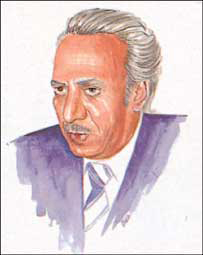
Abdel Sabour
By George Nicolas El-Hage, Ph.D.
[For Part 1 of this essay, click here. For Part 2, click here.]
7. Sabour’s Departure from Traditional Arabic Poetry
Up until now, I tried to demonstrate Eliot’s influence on Abdel Sabour’s poetry, especially with regard to his themes and techniques. Because of the vast gulf that separates the two poets culturally, spiritually, and educationally, it seems a vain effort to look for absolute similarities. On the other hand, it is easier for the critic with an adequate knowledge of the traditional models of Arabic poetry to notice that Sabour’s modern poetry departed almost completely from the classical tradition.
Prior to his exposure to the poetry of T.S. Eliot, Sabour wrote traditional poetry using the classical meters. After reading Eliot, the Egyptian poet adopted new themes, techniques, and structures. He no longer used traditional meters with the long, heavy lines, built on two hemistiches and rhyming with each other throughout the poem. This new type of poetry was able to come into existence and flourish after a long struggle led by contemporary poets like Abdel Sabour. (19)
Starting in the late 1950s, the experience of writing in free verse became a familiar occurrence. In the poetry of Sabour, not only the mood, style, use of myth and illusion, and the interior monologue resemble Eliot’s, but “we have a sense of aimlessness and isolation, of memory and futility, it is definitely the mood of The Wasteland and the Hollow Men.†(20) Moreover, there are clear-cut images in Sabour’s poetry which demonstrate Eliot’s great influence on the Arab poet’s attitude toward life and death. Sabour also makes use of Eliot’s theme of alienation and of his description of empty rooms. In “The Love Song of J. Alfred Prufrockâ€, Eliot says:
“The yellow fog that rubs its back upon the window-panes.
The yellow smoke that rubs its muzzle on the window-panes.â€
Sabour says, echoing Eliot in his “My Peerless Starâ€:
“Fingers of an eastern wind
Rub the window-panes.†Continue reading T. S. Eliot’s Influence Upon Salah Abdel-Sabour, #3
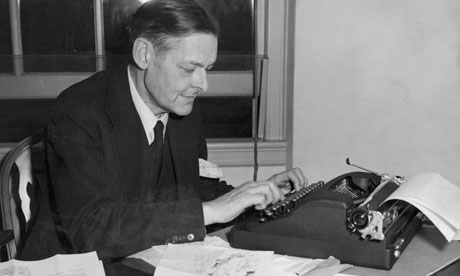
T. S. Eliot
By George Nicolas El-Hage, Ph.D.
[For Part 1 of this essay, click here.]
4. A Brief Summary of Eliot’s Background
T.S. Eliot, the Anglo-American poet, was born in 1888 in Saint Louis, Missouri. He studied at Harvard, the Sorbonne, and Oxford. Despite the fact that Eliot was brought up in a conservative Christian atmosphere, he exposed himself later to a completely different culture when he went to live in England. It is obvious that the political and spiritual world in which Eliot lived bestowed upon him its own distinguishing characteristics.
Eliot was lucky in his education. Harvard offered him a thorough introduction to Dante and to Romance literature. Since his earlier poetry, Eliot was influenced by Dante. Dante held a central position in Europe and linked the Roman past with the modern age. In Dante, Eliot found the spiritual identity of Europe. This allowed him to try to make Europe more conscious of itself. Eliot also allowed the French culture to influence him. Originally an American without the inherited English rigidity, he accepted the characteristics of the French civilization. His views of criticism were those of Remy de Gourmont’s school, and Charles Maurras influenced him politically.
Although it is always possible to argue that Eliot is, after all, an American, no one can deny that his exposure to different cultures gave him a unique political and literary background. Of course, it was his genius and talent which contributed most to the production of his great works of poetry and criticism.
5. A Brief Summary of Salah Abdel Sabour’s Background
Salah Abdel Sabour was not only a major poet, but also the literary editor of a wide spread newspaper, Al-Ahram. He was born in 1931 in the provincial district of Zaqaziq, Egypt, in a conservative Islamic house. When he was twenty, he graduated from Cairo University with a degree in Arabic Language and Literature. Continue reading T. S. Eliot’s Influence Upon Salah Abdel-Sabour, #2

Up to 600 worshipers had attended the service and were leaving to receive free food being distributed on the lawn outside when two explosions ripped through the crowd. Photograph by Mohammad Sajjad/Associated Press
Enough blood has been shed in the past few days to make any sane person question how anyone could possibly justify such cold-blooded and senseless attacks on innocent people. The poison gas in Syria is bad enough, but now we hear that the Somali Shabab have decided to kill shoppers in a Nairobi mall rather than play Captain Hook off the East African coast and now at least 78 Pakistani Christians are killed in a blast at a historic church. This is the ugly side of religion. More than a hijacking of Islam, this is dragging the faith that produced great scholars like Ibn Sina and al-Ghazali into the sewer. To say that the Prophet Muhammad would have condoned this kind of indiscriminate murder is as absurd as the medieval Crusader claim that Jesus would bless the slaughter of Jews and Muslims. But at least the crusades ended several centuries ago.
Muslims killing fellow Muslims or Muslims targeting Christians for death are both equally insane acts. Every day the death toll rises in Iraq and Syria, as though we have returned to the days of the Mongols and Mamluks. Continue reading Enough! Damn this continued violence
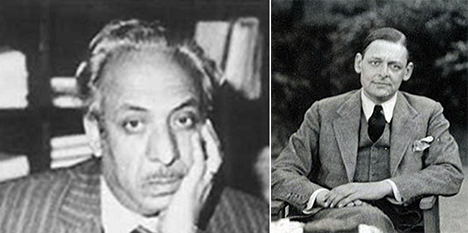
Salah Abdel-Sabour, left; T. S. Eliot, right
T. S. Eliot’s Influence Upon Salah Abdel-Sabour
By George Nicolas El-Hage, Ph.D.
The degree of influence of the Anglo-American poet, T.S. Eliot, on the Egypto-Arabic poet and dramatist, Salah Abdel-Sabour, has not yet been vastly explored. In this article, I shall not only attempt to compare the two poets in a more enlightened perspective, but I shall also probe the fundamental methodology governing a general comparative study. My approach includes the following:
1. A Valid Comparative Study and the Importance of Comparative Literature
2. Traditional Arabic Poetry
3. Why T.S. Eliot?
4. A Brief Summary of Eliot’s Background
5. A Brief Summary of Abdel Sabour’s Background
6. A Practical and Comparative Analysis of One of Sabour’s Poems
7. Abdel Sabour’s Departure from Traditional Arabic Poetry
8. A Brief Comparison between Two Plays
9. Conclusion
1. A Valid Comparative Study and the Importance of Comparative Literature
A fruitful and acceptable treatment of a subject which discusses the influence of one poet upon another must not stop at the limits of a shallow consideration of the most obvious similarities of forms, meanings, and techniques. It must go to the depths to consider the various elements that concern the sources of similarities, as well as the differences, in the light of the cultural backgrounds of the two poets. For example, a comparative study between Corneille and Racine, Wordsworth and Coleridge, and Sabour and Mahmoud Darwish would not be valid for each pair of these poets or writers belongs to the same culture and submits to the same political and social atmospheres.
Comparative Literature is neither a literary comparison nor a mere translation of a foreign literature. It is, as Jean-Marie Carre says, a study of the international and spiritual relations between men and cultures. A meaningful comparative study requires two artists belonging to remote cultures, yet dealing with the same literary genre. The comparativist, thereby, investigates the major differences existing between the environments which produced habits, customs, and verbalization of thought. Again, it appears necessary to investigate the spiritual and material factors which establish the concepts of every culture. It is also necessary to determine the degree of understanding each poet has of his own literary tradition and to ascertain the extent to which his cultural heritage pervades his poetry. The political, religious, economical, and linguistic elements are important factors to be considered. Continue reading T. S. Eliot’s Influence Upon Salah Abdel-Sabour, #1
Newspapers love a juicy story line. What could be more apt for tabloid sensationalism than one that combines multiple sex partners and jihad fighters? The Telegraph (no one seems to have informed the management that telegraphs are a bit on the ancient side these days) has come up with the following headline ‘Sex Jihad raging in Syria, claims minister” for its September 20th edition. Here are the lead paragraphs…
Tunisian women have travelled to Syria to wage “sex jihad” by comforting Islamist fighters battling the regime there, Interior Minister Lotfi ben Jeddou has told MPs.
“They have sexual relations with 20, 30, 100” militants, the minister told members of the National Constituent Assembly on Thursday.
“After the sexual liaisons they have there in the name of ‘jihad al-nikah’ – (sexual holy war, in Arabic) – they come home pregnant,” Ben Jeddou told the MPs.
He did not elaborate on how many Tunisian women had returned to the country pregnant with the children of jihadist fighters.
Jihad al-nikah, permitting extramarital sexual relations with multiple partners, is considered by some hardline Sunni Muslim Salafists as a legitimate form of holy war.
The minister also did not say how many Tunisian women were thought to have gone to Syria for such a purpose, although media reports have said hundreds have done so.
Here is a new twist that might actually revolutionize the way jihad is being waged by the most militant crazies. Continue reading Make love and make war?